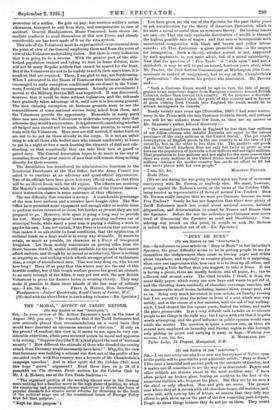THE " MORAL " ASPECT OF TARIFF REFORM.
[To THE EDITOR 07 " SPECTATOR.")
Sra,—In your review of Mr. Arthur Baumann's book in the issue of August 19th you say: " He remarks that if the Tariff Reformers had ever seriously placed their recommendations on a moral basis they would have disarmed an enormous amount of criticism." If only on the ground of candour, this view is, it seems to me, open to very con- siderable objections, albeit your reviewer points its moral and approves it by writing : "Suppose they [the T. R.'s] had played the card of ` national security' / How different the attitude of those who dreaded the coming attack from Germany would necessarily have been I " Why, Sir, the view that Germany was building a colossal war fleet out of the profits of her one-sided trade with this country was a keynote of Mr. Chamberlain's campaign speeches ! And in- what spirit did the Cobden Club moot this huge " moral " argument / Read these lines on p. 29 of a pamphlet on The German Panic written for the Cobden Club by 'Mr. 3. A. Hobson, one of the Free Trade Sachems :— " The organised portion of the working classes sees in the German scare nothing but a familiar move in the high game of politics, by which the employing and possessing classes endeavour to divert the force of popular demands for drastic social reforms by thrusting to the front of the political stage one of the sensational issues of Foreign Policy kept for that purpose."
' KORLIOT that. purpose " 1 You' have given me the run of the Spectator for the past thirty years to ask consideration for the theory of American Protection, which is far more a moral or social than an economic theory. Its loading tenets are two—(1) That the only equitable distribution of wealth is through the highest possible rate of wages ; and that rate is incompatible with unrestricted competition with black and brown and yellow labour outside ; (2) That Protection—a great protected area—is the magnet for immigration. Such a theory, whether corroot or not, supported by such arguments, is, you must admit, full of a moral subjectivity. Now that the question of " Free Trade " is " wido open " and not, a shibboleth, it may be well to put on record, fourteen years after, what Mr. Proctor, tho Civil Service Commissioner at Washington (the Com- missioner in control of emigration), had to say of Mr. Chamberlain's " preferentials " the moment his project was announced. Mr.. Proctor said:—
"Such a Customs Union would be apt to turn the tide of immi- gration to an important degree from European countries toward British Colonies, rather than toward this country. If, for instance, a discrimi- nating duty was placed upon the grain of this country and in favour of grain coming from Canada into England the result would be to attract immigrants to Canada."
Nearly twenty-nine years ago (November, 1887) I had some contro- versy in the Times with the late Professor Goldwin Smith, and perhaps you will let me exhume these few lines, as they are an answer to Mr. Baumann's rather belated discovery :- " The annual purchases made in England by less than four millions of our fellow-citizens who inhabit Australia are equal to the annual purchases of the sixty millions in the Unitod States. The per capita consumption of English goods in the one country is at the rate of £10 annually, but in the other is less than Ile. The markets our goods find in the far-off Southern Seas are only not twice as groat as now because the population of Australia is four millions and not eight millions. That population is four millions and not eight for the same reason that there are sixty millions in tho United States instead of perhaps thirty millions—because the mother-country has made no effort to fill hos own waste places with her own people."
[Wo are not during the war going to enter upon any form of economia controversy with Mr. Frowns or anybody else. We must, however, protest against Mr. Hobson's views, or the views of the Cobden ClUb, being treated as representative of those of normal Fres Traders Does Mr. Frowen really imagine that wo wore pro-Germans because we wore Free Traders ? Surely he has not forgotten that there were plenty of Tariff Reformers much less sound about national service, national preparation, and determination to stand by Franco and Russia than the Spectator. Before the war the orthodox pro-Germans wore never tired of denouncing the Spectator as cruel and bloodthirsty. Con- nidering our record on this point, to couple us with Mr. Hoban' is indeed the unkindest out of all.—ED. Spectator.]






























 Previous page
Previous page